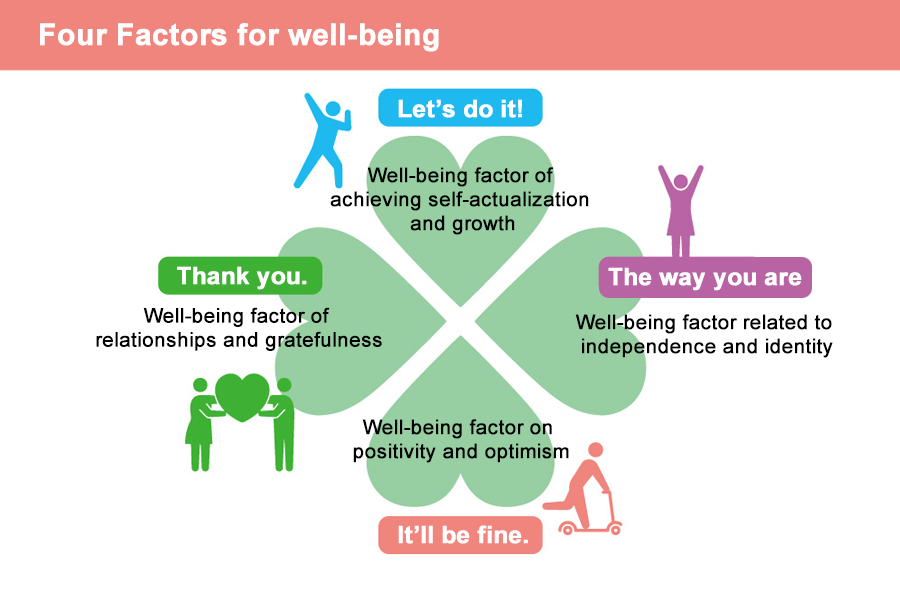What is The Concept of "Well-being"? An Interview with a Well-being Studies Expert
Jul. 22, 2022
Yuichi Yamagishi

"Well-being" is a term that is being increasingly used in business and the news. It can mean a "good state," but it can also mean "happiness."
The term first appeared in the Charter of the World Health Organization (WHO) in 1946, and for nearly 80 years since then, research on "well-being" has been conducted at universities and other institutions.
So why, then, has there been such an increase in attention on this keyword in recent years? And what is the future relationship between this concept of "well-being" and the corporate world?
We asked Professor Takashi Maeno, a leading expert in the study of well-being and a director at the Wellbeing Research Center at Keio University Graduate School.
What is "well-being"?

-- Mr. Maeno, you are involved in the study of well-being at university. What does "well-being" mean?
Takashi Maeno: If you look up "well-being" in the dictionary, you will find the terms "happiness," "health," and "welfare" listed as definitions, which all have multiple meanings. Doctors use "well-being" to mean "health," and in the field of welfare, it simply means "welfare.” Taken broadly, it is a concept that refers to "a good state of mind, body, and society."
To put it even more simply, "well-being" means this: "The aim is for lasting well-being for society as a whole by thinking about one's own well-being while at the same time thinking about the well-being of everyone else." I believe that the term refers to such a state.
-- So the keyword is “lasting”?
Maeno: Yes. It is not an instant well-being like when you win a lot of money in the lottery. It is a sense of lasting well-being, like the feeling you get when you watch your child grow up.

-- Why has this notion of "well-being" become increasingly important in recent years?
Maeno: It’s because of the increasing significance of the adverse effects from issues related to the environment and poverty. Additionally, the pandemic and various wars have accelerated the recognition of the importance of "well-being."
In recent years, moreover, many companies and organizations have started to tackle the Sustainable Development Goals (SDGs), and sustainability and mindfulness have become hot topics.
All of this is linked to the fact that society has become more focused on mental health. Hence, "well-being," which has been studied since ancient times, has now become more important.
Today, many countries and companies have come to recognize that aiming for economic growth alone is unacceptable. We now live in a society that desires a good state of mind, a state of total "well-being" that includes spiritual enrichment, consideration for the global environment, and a response to poverty issues.
How is well-being measured?
-- Companies that place importance on "well-being" are increasing. However, as well-being is invisible, it may be difficult to create a standard to measure how much "well-being" is being achieved.
Maeno: I advocate the "four factors for well-being" that contribute to well-being, which I have derived from many years of research.

I define the feeling of well-being as being when these four factors are all satisfied, like a four-leaf clover in which all leaves are connected without omitting anything.
Let’s take businessperson as an example. Leveraging one's strengths, being rewarded, being grateful for relationships with others, tackling challenges optimistically and positively, and making use of one's unique personality… when these factors are achieved at the same time, people can work with a happy state of mind. When a corporate culture is created in which all employees can work to fulfill the four factors, the company is in good shape.
-- So how exactly can well-being be measured using the four factors of well-being?
Maeno: For example, we can conduct a questionnaire or psychological test on all employees and show the satisfaction level of the four factors on a radar chart for each individual, position, and department. Like the results of a physical exam, the distribution of these factors can be used to visualize whether the job is rewarding, whether the team feels connected, and so on.
If visualized, breaking down the elements of well-being and taking a multifaceted view is useful for improving the organization and a variety of other purposes. Many of the companies that have implemented the program have a firm grasp of the importance of "well-being."
I recommend these "four factors for well-being" to companies as a guideline when taking advantage of "well-being." Of course, this is not the only indicator of well-being, and researchers may use a variety of methods to analyze well-being, but I hope it will serve as a reference.
All industries to become "well-being" industries

-- In the 2024 Mid-Term Management Plan announced in April 2022, Hitachi identified "well-being" as one of the key concepts for business continuity. How will the relationship between companies and "well-being" develop in the future?
Maeno: I believe that all industries across the world will become "well-being" industries in the future. I think it is possible to create products, services, and organizations in all fields that meet the conditions of "well-being," such as offices and trains, which should aim to make people "happy."
And it is no longer unusual for consumers to express their will through boycotts against companies that do not care about the environment or that do not improve the work environment. In the same way, a company's attitude toward "well-being" will affect its corporate value in the future.
I believe that the concept of "well-being" will spread further in the future and move us toward a better society. I hope that the Hitachi Group will continue to develop products and services that take "well-being" into consideration.



